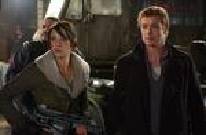This Land Is Alive!
by

In 1968, with little more than $100,000 and a camera, George A. Romero filmed Night of the Living Dead and not only created one of the most successful cult films ever but also birthed an entire genre. Hundreds of zombie films have been made since then, but none as resonant and important. Until now! With Land of the Dead, Romero reminds us that he's not only a master of horror but also a great storyteller who just happens to ply his craft in the zombie genre.
Land of the Dead continues Romero's legacy of combining non-stop scares and horror with smart socio-political commentary. The film's post-9/11 significance is both entertaining and shocking. If you don't find horror in the sanguine dismemberments and gory bowel shredding, perhaps the film's statements of the continued naiveté and ignorance of post 9/11 America will make you snicker knowingly. Romero's sense of satire is smart and biting. His filmmaking talent has matured to the point that I'm convinced he could have told this same story of American class warfare in a conventional drama and it would have been just as effective. But zombies are much more fun.
In Land of the Dead, Romero creates a small microcosm of America, complete with three class divisions of citizens, and calls it Pittsburgh. The living humans have barricaded themselves in the city that is protected on three sides by rivers and on the fourth by electric fences and military might.
To keep away from the zombies, the city's upper class citizens restrict their presence to a tall skyscraper called Fiddler's Green, run by a rich businessman name Kaufman (Dennis Hopper). Within the calm and quite of Fiddler's Green, residents are able to go about their normal daily lives while turning a blind eye to the problems outside their steel and concrete cocoon. However, this is their error and just might be their undoing. Foolishly, they think they can live their lives free of the worries of the outside world. Hopper is the film's most memorable character as Fiddler Green's top aristocrat. Only his unique singsong delivery could turn such a simplistic line into the film's most memorable quote. "Zombies, man. They creep me out!"
The middle class is relegated to the dirty streets and grimy alleyways of the city. They pass the time in relative squalor indulging in such vices as gambling, drinking and prostitution. Lead by Riley (Simon Baker), our middle-class protagonists of the story make a living by penetrating the abandoned dark and dangerous world across the river to scrounge for food and supplies that they then sell to the residents of Fiddler's Green. Riley hopes to eventually leave this life and flee to Canada, which has apparently been able to avoid the zombie problem. It's a dangerous job they do and I'm not sure why they don't go out during the day, as we all know zombies shy from the sunlight.
And, of course, the ravenous zombies, whose sole existence is to search for a fresh supply of human flesh, represent the lower class. Being the innovator that he is, Romero takes the zombie idea to a new level. But he's not as radical as Danny Boyle's flesh eaters were in 28 Days Later, who could cover 30 yards in the blink of an eye. In a clever complement to James Whales' Frankenstein, Romero's new generation of zombies are constantly evolving and can think, reason, and learn. They're lead by a husky, coverall-wearing gas station attendant (Eugene Clark) who teaches them to use tools, power equipment and simple deductive reasoning.
Purposefully, the zombies work up a certain amount of sympathy and commiseration from the audience as they represent the struggling members of an exclusionary society. But Romero certainly has no problem creating numerous ways to destroy them. Lopped off heads, degloving injuries and disembowelments give the film a deserved "R" rating. Land of the Dead carries an unmistakably obvious message that taunts and mimics the state of today's society. In one scene, Kaufman is forced to strike a bargain with one of the middle class supply runners, but his reply is "we don't negotiate with terrorists." The fact that it is nearly a direct quote from President Bush's war on terrorism indicates Romero's tongue-in-cheek willingness to get a laugh from the audience at the expense of being overly obvious.
Even if you choose to ignore the film's political subtext or didn't realize it had one in the first place, Land of the Dead is still a great zombie movie. Part of the fun viewing Land of the Dead involves watching for Romero's clever references to his earlier films.
(Released by Universal Pictures and rated R for pervasive strong violence and gore, language, brief sexuality and some drug use.)
Review also posted on www.franksreelreviews.com.




